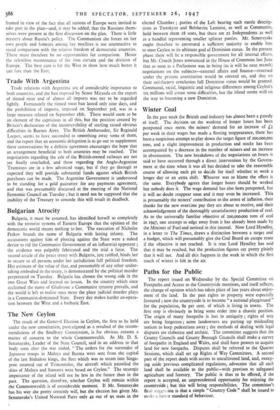Paths for the Public
The report issued on Wednesday by the Special Committee on Footpaths and Access to the Countryside mentions, and itself reflects, the change of opinion which has taken place of late years about enjoy- ment of the land. In the past rights to property were especially favoured ; now the countryside is to become " a national playground " for the population, 8o per cent. of which is living in towns. The first step is obviously to bring some order into a chaotic position. The origin of many footpaths is lost in antiquity ; rights of way are being forgotten ; some landowners are putting up misleading notices to keep pedestrians away ; the methods of dealing with legal disputes are elaborate and archaic. The committee suggests that the County Councils and County Borough Councils shall make a survey of footpaths in England and Wales, and shall have powers to acquire land for new footpaths. Disputes shall be referred to the Quarter Sessions, which shall set up Rights of Way Committees. A second part of the report deals with access to uncultivated land, and, sweep- ing aside previous complicated regulations, advocates that all such land shall be available to the public—with provisos to safeguard agriculture and forestry. The public is thus to be offered, if the report is accepted, an unprecedented opportunity for enjoying the countryside ; but this will bring responsibilities. The committee's final suggestion is that a simple "Country Code" shall be issued to evoke a better standard of behaviour.


































 Previous page
Previous page